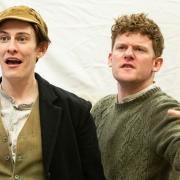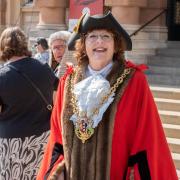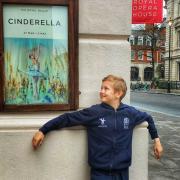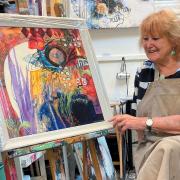Suffolk-based author Victoria Panton-Bacon tells the story of RAF pilot Alistair Panton who flew dangerous reconnaissance missions during WW2

When Victoria Panton Bacon was going through boxes of her late father’s belongings she came across a brown envelope left by his father, her grandfather.
Inside – some handwritten, some typed – were his memories of his days as an RAF pilot during the most fiercely fought periods of World War II.
It set her on a journey which began with a book about the role her grandfather, Alastair Panton, played in the battle to defend France. That has led to a second book telling of the wartime experiences of a dozen men and women, including some from Suffolk and Norfolk.
Remarkable Journeys of the Second World War, also contains prisoner of war stories written by Alastair who, after his aircraft was shot down, was captured by the Germans and spent five years in concentration camps, including the notorious Stalag Luft III, scene of what became known as The Great Escape.

“I think it is absolutely right we are asked to remember these veterans and in doing so acknowledge the physical and emotional pain of so many,” says Victoria.
Victoria, ex-wife of Conservative MP Richard Bacon, now lives in Bungay with her two sons, Rollo, and Ranulph, and her partner, William Drew-Batty, composer, pianist, organist and singer.
She helps run a charity called Elizabeth’s Legacy of Hope, founded following a road accident in London in 2007 which claimed the life of her mother, Elizabeth, badly injured her twin sister, Sarah, and led to the right leg of Sarah’s two-year old daughter, Pollyanna, having to be amputated. They had just been to visit Victoria in hospital where she had given birth to her first child. Elizabeth’s Legacy of Hope raises money to enable amputee children in West Africa and India to receive prosthetic limbs.

Read: What makes a Suffolk person?
Victoria was born and brought up in Shropshire. She was always interested in journalism and writing, and curious about people. After completing a secretarial course, she did some travelling, including time in Hong Kong and as an au pair in France. Back in the UK she worked in the chairman’s office at the London Stock Exchange, then moved to Birmingham to work for a firm of solicitors. She soon got bored and enrolled for a post-graduate journalism course in south London, and got a job as a press officer at Conservative Central Office.
“I’ve always been interested in politics, particularly the constituency side because that’s when you really get involved with people and their lives,” she says.
She was transferred to the political office at 10 Downing Street during John Major’s term as Prime Minster and in the run-up to the 1997 General Election. Her job was to liaise with MPs and set up meetings.
“It was a very difficult time. The Tories had been in power for 16 years. John Major was a considerate man but he had his moments and I was in the firing line a few times. He was really tough,” Victoria says. She continued working for John Major in the House of Commons before returning to Central Office.
Then she decided to give in to her love of seals. As a child, with her dad, she had watched seals up and down the coast and had built up a big collection of fluffy toys and models of them. As an adult in the workplace she decided to indulge her love for the creatures and got work as a volunteer in a Dutch seal sanctuary.
“I had to get up at 6am, peel the herrings from blocks of ice and clean the baths used for the seals. I was there three or four months. I loved it – it was amazing.” Later, Victoria worked with the BBC and returned to the sanctuary to make a film about its work. She then went into the main newsroom as a producer, working on stories at home and overseas.
Eight years ago she came across her grandfather’s wartime notes. “I knew they existed because my mother had typed some of them up about 30 years previously but I wasn’t actually looking for them and I didn’t expect to find them. When I read them I realised what he had written was an important missing part of the World War II jigsaw,” she says.
Flying Officer Alastair Panton – eventually Air Commodore and, finally, Provost Marshall in charge of the RAF police – was just 23 years old when his squadron was deployed across The Channel in the defence of France. Flying vital, dangerous, low-level reconnaissance missions throughout the campaign, Alastair survived two horrific crashes.
Victoria was moved by the content of the notes and arranged them in book form before interesting a publisher. Six Weeks of Blenheim Summer, a pilot’s extraordinary account of the Battle of France was well received and later published by Penguin.
“My grandfather was no spitfire ace. He was the pilot of a Bristol Blenheim aircraft and his job was reconnaissance. With his crew of two, he flew low many times over enemy territory.” He survived the first crash and risked his life to save his two crew members. In the second crash he suffered serious injuries and his tail gunner died.
“I know he had nightmares every night of his life about the man he couldn’t rescue. He could still hear the man’s screams as he was burnt alive.”
Alastair’s stories of five years spent in concentration camps are part of the new book. It tells the story of a dozen veterans who lived under the long shadows cast by war and whose young lives were changed forever. Research for the book was helped by the Blenheim Society and the Propeller Project which enables wartime air crew to be flown by the owners of private aircraft to an annual airfield gathering. However, the book includes the stories of soldiers and sailors as well as air crew.
“It was through Stanley Dixon of Wymondham, a former Blenheim navigator, that I heard about the Propeller Project. I started to meet other veterans and listen to their stories. If they were willing to talk to me about their memories I didn’t want to ignore them.
“Their stories are precious, exciting, heart breaking, and recording them is vitally important because when these veterans die their stories would otherwise be lost.”
Though many tales are sad and tell of the loss of friends and family members, there are also stories of joy and love found in the darkest of times. One of the most moving comes from Mady Gerrard, a Jew who was sent with her family to Auschwitz at the age of 14 and was later moved to Bergen-Belsen. She was one of 10,000 at Bergen-Belsen who survived. Fifty thousand others died there.
One chapter tells the story of Douglas Huke from Lowestoft who served in the merchant navy throughout the war and died at the beginning of 2020 aged 102. Another story is from Ray Edwards who lives near Beccles and whose brother, Ronnie, was a rear gunner.
“This is remembrance year and I find it so poignant and powerful and sad that the experiences of veterans like these are passing from living memory. These are people whose stories have never been heard before.
“It is an emotional journey for people to recall their war years and you can only do it with the support of their families. You have to be very sensitive. Since I started writing this book I have dreaded the phone calls which tell me another one of the veterans has died.”
Remarkable Journeys of the Second World War is published by The History Press, price £16.99
A legacy of hope
Victoria sets out why donating to the child amputees charity set up in memory of her mother will be so valuable this Christmas.
“This year has, of course, been very different for the child amputees that Elizabeth’s Legacy of Hope supports. The life challenges for these children are immense – they are some of the most vulnerable, lonely and stigmatised children in the world. Elizabeth’s Legacy of Hope amputees – about 25 in Sierra Leone and Liberia, and 50 in India – have had to cope with Covid virus lockdowns too.
“This has meant no school, but also sadly for them little support with their prosthetics because of travel restrictions.
“Even harder has been resulting food shortages because in these countries most of the food is bought on the street, and people haven’t been allowed to sell. So, we have done what we can – buying rice to stave off their hunger, and providing books to keep minds lively.
“Thankfully, however, things are slowly improving and all of the children have been checked and are safe. Schooling has resumed, smiles are returning.
“Elizabeth’s Legacy of Hope has, like all charities, had to fundraise in different ways too – being as imaginative as it can with the internet, tapping into all the resources available. We were very encouraged, a few weeks ago, to raise just under £1,500 through the creation of a musical composition, telling the story of ‘Lockdown’, using 19-word quotes given to her by friends, family and neighbours.
“Donations were given to the charity in return for being part of what we hope will prove to be an important historical creation. The music was written and performed by my partner William Drew-Batty, and images added by his daughter Chloe. “In the light of its success, we are repeating this challenge. The aim is to create a musical collage that reminds us all about the significance of giving, at a time when sharing and caring has never been more relevant.
“The work will be called The Year we all came Home. The promise, if plenty of wonderful quotes are sent in is a creation that ensures that, somehow, this year is remembered for all the right reasons. Every year, we are asked at Christmas to think of those less fortunate than ourselves. Surely this sentiment has never been more important. Many of our child amputees are having to wait longer than we would have wanted for the gift of mobility. Please think hard and give generously!”
Victoria is asking readers to use 12 words to give their thoughts on ‘giving’ at this time of year, and send them to: manager@elizabethslegacyofhope.org, by 31 December.
To donate, read more about the challenge, visit the website for Elizabeth’s Legacy of Hope.



























